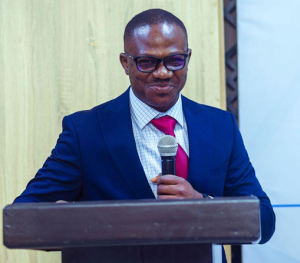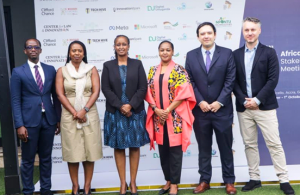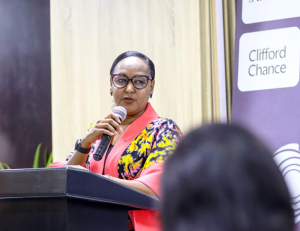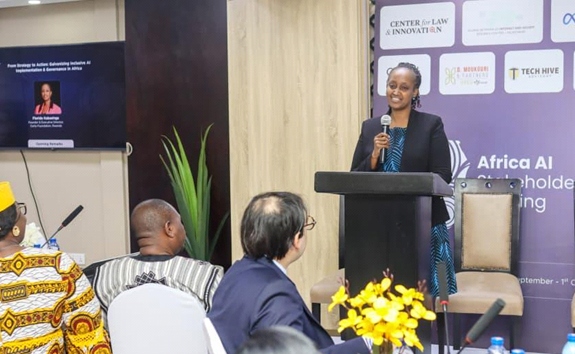The call for inclusivity in Africa’s artificial intelligence governance to move beyond rhetoric and become a measurable reality emerged as the central message at the Africa AI Stakeholder Meeting on Innovative Governance and Capacity Building opening, which took place in Accra this week.

The Summit was co-convened by the Centre for Law and Innovation (CLI) and Global Network of Internet and Society Research Centres Secretariat (NoC), together with partners Meta, Microsoft, Deutsche Gesellschaft für Internationale Zusammenarbeit (GIZ), GmbH and Npontu Technologies.
Others include Clifford Chance, D. Moukouri & Partners, Tech Hive Advisory, Innovation Spark, Digital Umuganda, Globetrotters, Icelis Global and the Africa Digital Rights Hub. It drew participation from across Africa and beyond, reflecting a broad coalition committed to shaping the continent’s AI future
Participants at the gathering agreed that the gulf between innovation and policy, too often unaddressed, undermines both trust and outcomes – stressing that the continent cannot afford to replicate past patterns of technological dependence, wherein innovation advances without matching governance frameworks.
They noted that Africa’s ability to harness artificial intelligence for development will depend not only on investment and infrastructure but also ensuring that governance structures reflect the voices of all communities, particularly women, youth and other underrepresented groups.
Preceding the Africa AI Stakeholder Meeting, regulators from across the continent convened for the ‘Regulators Workshop: A Practical AI Governance Training for Regulators’.
Dr. Arnold Kavaarpuo, Executive Director and Commissioner of the Data Protection Commission, opened the convening by saying regulators must nudge the creation of innovation and put in place correct frameworks.

He set out three priorities for the workshop: developing supervisory plans for emerging use cases; establishing baseline controls for vendors and deployers of AI systems; and ensuring each regulator leaves with at least one peer collaboration, given the presence of over ten regulatory institutions from across Africa. He closed by stressing that Africa should not remain a policy-taker, but position itself as a standards-setter.
Florida Kabasinga, Founder and Executive Director-Certa Foundation, set the tone by warning innovation and governance in Africa too often move at different speeds, leaving a gap that generates uncertainty for innovators and risks for citizens.
Providing a rationale for the meeting, she said it was intended to close that gap by ensuring policymakers, regulators, innovators and civil society are not merely reacting to technological developments but actively shaping their use in responsible ways.
“When women and young people are fully included in shaping technology, we unlock perspectives and solutions that would otherwise be lost,” Ms. Kabasinga noted.
She further stated that inclusivity is not an optional addition but the benchmark for whether artificial intelligence will serve the whole society.
“Inclusivity is not an add-on; it is the measure of whether AI will truly serve all of society,” she said.
The forthcoming FemAI programme in Rwanda, which will train female members of parliament on artificial intelligence and its governance implications, was set forth as an example of practical step toward embedding women’s perspectives into policymaking.
Her remarks come against a backdrop of persistent gender disparities in Ghana’s public and technological spheres. Women currently hold only 41 out of 275 seats in parliament, representing 14.5 percent of elected members.
In the local governance system, female representation is even lower – standing at less than five percent of District Assembly members. To address this imbalance, parliament passed the Affirmative Action Gender Equity Law in July 2024 – which sets a target of at least 30 percent female participation in public office by 2030.

The technology sector presents a similar picture, with women making up just 17.6 percent of the country’s tech workforce, with their presence even scarcer in specialised fields such as cybersecurity.
Globally, women occupy fewer than 30 percent of roles in technology and the proportion in leadership positions is markedly lower, with a Women Who Tech report published in 2023 showing that only 2 percent of venture capital funding went to all-female founding teams, with a global average of around 1.6 to 2 percent of VC funding going to women-led startups.
Ms. Kabasinga said it is important to ensure that Africa does not import governance models from elsewhere without adapting them to the continent’s needs.
“Africa cannot be a passive consumer of rules written elsewhere. We must actively shape our own AI future,” she remarked, adding that such efforts must prioritise inclusivity as both a principle and a practice.
For her, the critical measure of success will be whether inclusivity moves from aspiration to reality, reiterating: “When women and young people are fully included in shaping technology, we unlock perspectives and solutions that would otherwise be lost”.
Other speakers reinforced this emphasis. Armando Guio, Executive Director-Global Network of Internet and Society Research Centres, proposed the creation of an Africa Regional Hub. This hub will support regulatory learning, allowing stakeholders to “understand and to learn from the experiences and lessons of what has failed, what has worked”.
He warned that emerging technologies such as generative and agentic AI present urgent challenges that demand agile governance rather than delayed reaction.
Rwanda’s High Commissioner to Ghana, H.E. RoseMary Mbabazi, highlighted her country’s experience in digital transformation – calling for African governments to chart their own paths with policies that are “wise, inclusive and proactive”.
Referencing President Paul Kagame, she reminded delegates that: “Africa cannot afford to be left behind, once again playing catch-up. We have to adapt, cooperate and compete”.
Dr. Shyllon Ololade, Director of Privacy Policy, Africa, the Middle East and Türkiye at Meta, noted that Africa holds 60 percent of the world’s best solar potential yet still struggles with electricity access; and while 60 percent of its population is under 25, only 1 percent are innovators.
The continent hosts just 1 percent of global data centres even as its fintech sector continues to boom. She argued that these contrasts show Africa is different and has what it takes to shape AI on its own terms, but only if it turns its advantages into real capacity.
Nonye Ujam, Director of Government Affairs at Microsoft West Africa, delivered the keynote speech opening the second day, noting that AI’s adoption is moving at an unprecedented pace – with ChatGPT reaching 100 million users in just three months compared to 16 years for mobile technology.
She said Africa stands to gain up to US$1.5trillion in economic impact by tapping just 10 percent of the global AI market and as much as US$2.9trillion with half a million jobs by 2030, but only if the continent fixes its power infrastructure, strengthens governance and invests in its young talent.
She emphasised that responsible AI cannot exist without intentional capacity building. Since 2016, Microsoft has anchored its work on a Responsible AI framework grounded in six principles: fairness, reliability and safety, privacy and security, inclusiveness, transparency and accountability, ensuring that human accountability – rather than system accountability – remains central to AI decisions.
Building on this foundation, Microsoft has invested heavily in training; upskilling over 690,000 people in Nigeria since 2021 and certifying more than 125,000.
To make these opportunities widely accessible, she highlighted the AI Skills Navigator – a platform that enables users to create customised learning tracks based on their current capabilities and knowledge levels. With resources available online and designed to bring learners to a common baseline, the platform ensures no one is left behind in the AI transition.
“We cannot stress enough the importance of capacity building. We need to be intentional and deliberate in equipping Africans with the tools to understand and shape the technology before they can effectively use it,” she said.










